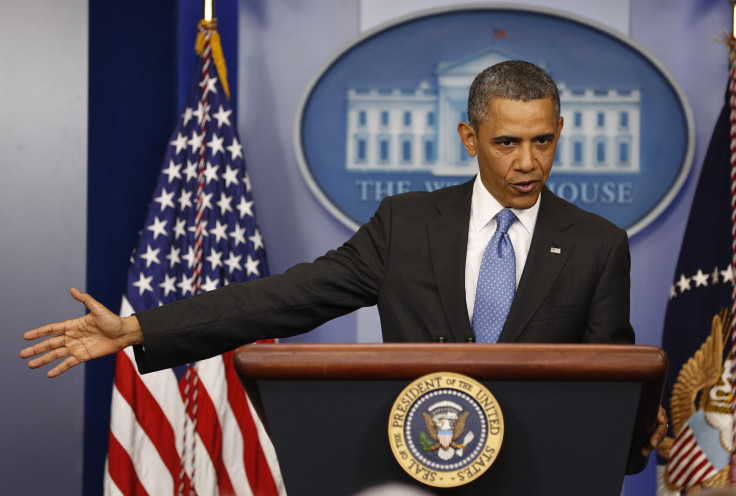Obama Dares GOP To Filibuster With Judicial Nominations To D.C. Circuit

In a pattern that has become routine since he took office, on Tuesday President Barack Obama nominated three lawyers to serve on the Circuit Court of Appeals for the District of Columbia, and Republicans responded with reasons not to confirm them.
But this time, the president appears to have had enough. After two previous nominees to the court were blocked by Republicans – and one nominee, Sri Srinivasan, was confirmed – Obama employed a new strategy and submitted nominees to fill the D.C. Circuit’s three vacancies all at once; if Republicans blocked all three, they would essentially be admitting that their objections were political and not about the merits of the candidates.
The fact that this is the D.C. Circuit, considered the most important court in the country after the Supreme Court, raises the stakes of the struggle between Obama and Republicans higher than usual. The D.C. Circuit, which hears cases on legislation, federal agency regulations, national security and civil rights issues, could determine the fate of many of Obama’s reforms. Further, Democrats have threatened to change the Senate filibuster rules if Republicans block the nominations.
In a full-dress White House ceremony typically reserved for Supreme Court and Cabinet nominations, Obama announced his selection of Cornelia T. L. Pillard, a Georgetown Law Center professor, Patricia Ann Millett, an appellate lawyer, and Robert L. Wilkins, a federal district court judge, to the District’s federal appeals court. The president dedicated almost all of his Rose Garden address to the problem of Republican “political obstruction” of his judicial nominees.
“Time and again, congressional Republicans cynically used Senate rules and procedures to delay and even block qualified nominees from coming to a full vote,” Obama said. “As a result, my judicial nominees have waited three times longer to receive confirmation votes than those of my Republican predecessor.”
In response to the nominations, Senate Minority Leader Mitch McConnell, R-Ky., questioned the necessity of appointing more judges to the court, an idea Sen. Chuck Grassley, R-Iowa, has promoted in legislation to eliminate the seats and add seats to two other courts. “I think the issue, if there is one, with regard to the D.C. Circuit, is the question of whether this circuit court, which is apparently less busy than all but one circuit courts in the nation, needs to have a full complement of judges,” McConnell said Tuesday. “Sen. Grassley has the statistics and is a good one to ask about the appropriateness of confirming these three judges.”
“There's a culture of intimidation throughout the executive branch of the federal government,” McConnell added. “But there's also a culture of intimidation here in the Senate.”
Prepared for this response, Obama used his speech Tuesday to pan Grassley’s proposal.
“When a Republican was president, 11 judges on the D.C. Circuit Court made complete sense. Now that a Democrat is president, it apparently doesn’t. Eight is suddenly enough,” Obama said as the audience laughed. “People are laughing because it's obviously a blatant political move.”
Led by Grassley, Republicans have argued that the D.C. Circuit’s smaller caseload means they don’t need more judges, while Democrats and court-watchers say that the complexity of the cases before this court mean filling the vacancies is necessary.
What happens over the next few months could determine the makeup not only of one of the nation’s most important courts, but also the Senate rules themselves. In recent weeks, Democrats have raised the possibility of changing the filibuster rules for judicial nominees if the D.C. Circuit picks aren’t confirmed, but on Tuesday, Senate Majority Leader Harry Reid, D-Nev., was more tight-lipped.
“I'm going to move those just as quickly as I can,” Reid said. And if one or more of the nominees is blocked, “Oh, I don't know. I'd have to take that one when we get there,” he said.
McConnell dismissed the idea that Republicans would confirm the nominees under a threat to change the rules. “We don't intend to be intimidated by [Reid] with a constant threat to break the rules in order to change the rules. If that's what's going to happen, we want to know it now, not some other time – now,” he said.
When it comes to nominees, McConnell said, Republicans have treated Obama “very fairly.”
© Copyright IBTimes 2024. All rights reserved.












